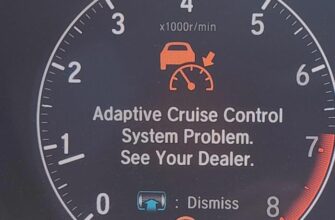A failing or bad alternator can leave you stranded when your car’s battery dies without warning. Learn the common signs of alternator problems and how to test your alternator so you can get it fixed before it leaves you without a working car.
Knowing how to check for alternator issues can help you avoid the inconvenience and cost of unexpected breakdowns. This guide will cover the basics of how an alternator works, symptoms of alternator failure, how to test alternator output, and options for replacement if needed. Read on to equip yourself with the knowledge you need to determine if your car’s alternator is malfunctioning.
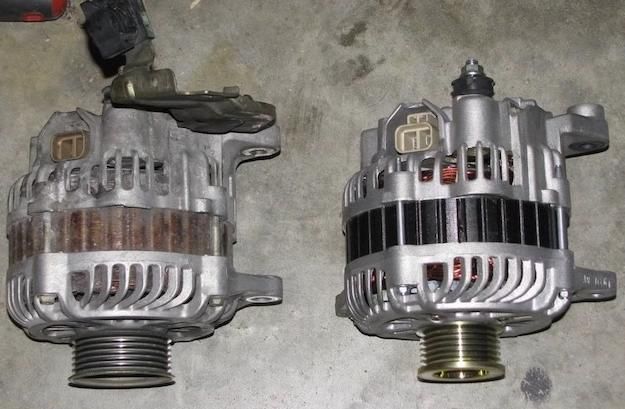
What Does an Alternator Do?
An alternator is the component that charges your car’s battery while the engine is running. It converts the engine’s mechanical rotations into electrical energy that powers your car’s electrical systems and recharges the battery.
Without a properly working alternator, the battery won’t get recharged and the electrical systems will gradually lose power as the battery drains. That’s why it’s important to look out for signs of alternator problems.
Top 10 Signs Your Alternator May Be Bad
Here are some of the most common indicators that your alternator may be failing:
1. Car Battery Keep Dying
If your battery seems to constantly run down prematurely, it’s likely because the alternator is no longer charging the battery sufficiently. This repeated battery drain can indicate faulty diodes in the alternator.
2. Dimming Headlights
As your car engine idles, watch your headlights. If they noticeably dim, flicker, or pulsate, that’s a strong sign your alternator isn’t providing steady voltage.
3. Warning Light Illuminated
Many cars have an “ALT” or battery warning light on the dashboard. If it comes on while driving, there could be an issue with the charging system.
4. Odd Noises From Under Hood
Listen for noises from the alternator while the car is running. Grinding, clattering, or squealing could signal a bad alternator bearing that requires replacement.
5. Battery Testing Poor
Get your battery tested to determine its state of charge. If it tests low despite regular driving, the alternator probably isn’t charging properly.
6. Electrical Components Acting Up
Issues like flickering dashboard lights, stalling electronics, or failing to start can indicate inconsistent power delivery.
7. Smell of Hot Wires or Plastic
A distinct burning odor could mean overcharged wires or internal alternator damage. Turn off the car immediately if you detect this.
8. High-Pitched Whining Sound
As alternators wear out, they may emit a high-pitched whine or scream that increases with engine RPMs.
9. Battery Light Stays On After Starting
The battery indicator light should go off once the car is running if the charging system is working correctly.
10. Car Stalls Out While Driving
If the alternator fails completely, the vehicle may stall as the battery loses ability to spark the engine. This is rare but can happen.
How to Test Your Alternator Output
Noticing potential symptoms of a bad alternator is just the first step. To officially diagnose whether your alternator is malfunctioning, you’ll want to test its electrical output. Here are a few ways to check alternator health at home with basic tools:
Use a Multimeter
A digital multimeter allows you to measure output voltage and current flow. To test voltage, attach the red probe to the alternator’s positive terminal and the black probe to the negative terminal. With the engine off, you should get a reading around 12 volts. If the voltage drops below 10 or 12 volts with the engine running, that indicates a problem.
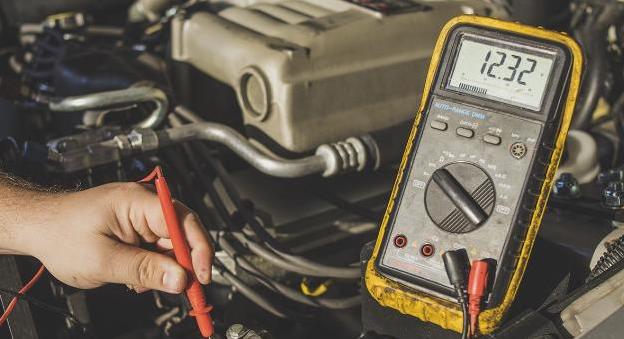
Check Voltage with Engine Off and On
Use a multimeter to detect if the alternator is struggling to charge the battery when the engine starts up. With the engine off, voltage should read 12-12.6 volts. Then start the engine and rev it to 1500 RPM – voltage should climb to 13.5-14.5 volts if charging properly.
Look for Ripple Voltage
Set the multimeter to AC voltage and hold the probes to the battery posts. If you see more than 0.5 volts AC, the alternator diodes could be malfunctioning.
Try a Battery Load Test
Turn on the high beams and max settings of heater/AC and radio. Watch voltage level – if it drops below 10 volts the alternator may be starting to go.
Check Operation of Warning Light
If the warning light doesn’t come on when you first turn the key, the sensor bulb may be burnt out, signaling potential issues.
Listen for Whining Noises
Rev the engine and listen closely for any audible whining coming from the alternator. The sound could indicate worn out bearings.
Testing your alternator is straightforward with the right tools. If you don’t feel comfortable performing electrical tests yourself, any auto shop can test alternator output for you quickly and easily.
How Much Does it Cost to Replace an Alternator?
If you’ve tested your alternator and determined it’s faulty, you’ll have to replace it in order to restore proper charging and prevent your car from breaking down. Here’s an overview of alternator replacement costs:
- Alternator Part Cost – $100 to $250 for a new alternator unit
- Labor Cost – 1-2 hours for installation, around $50 to $100 per hour
- Total Replacement Cost – Typically between $200 and $400, depending on car model
Buying a remanufactured alternator rather than new can save you money. Shop around, as prices can vary widely by location. Know the make and model of your vehicle to get an accurate quote for alternator replacement.
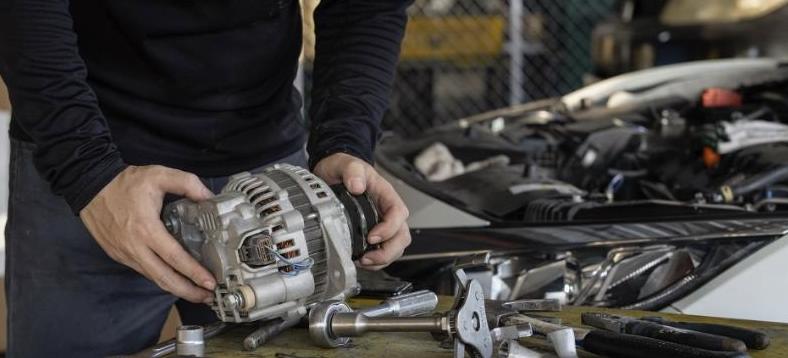
Can a Bad Alternator Drain a Brand New Battery?
It may seem counterintuitive, but a malfunctioning alternator can still rapidly drain a brand new, fully charged battery. That’s because the alternator is no longer converting enough mechanical energy into electrical energy to sustain the battery’s charge.
Once a new battery is installed, make sure to load test the charging system. Otherwise, the new battery will simply drain again. Replace the bad alternator to avoid immediately killing a new battery.
My Alternator Gets Hot – Is This Normal?
It’s completely normal for your alternator to get hot during operation. The internal components generate heat as part of the energy conversion process. As long as ambient temperatures don’t exceed 220°F or so, some heat is expected and not a concern.
However, if the alternator feels excessively hot, has a burning smell, or is smoking/steaming, those are signs of overheating and potential alternator failure. Make sure air circulation around the alternator is not obstructed if it runs hot. Adding an external fan can also help manage temperatures.
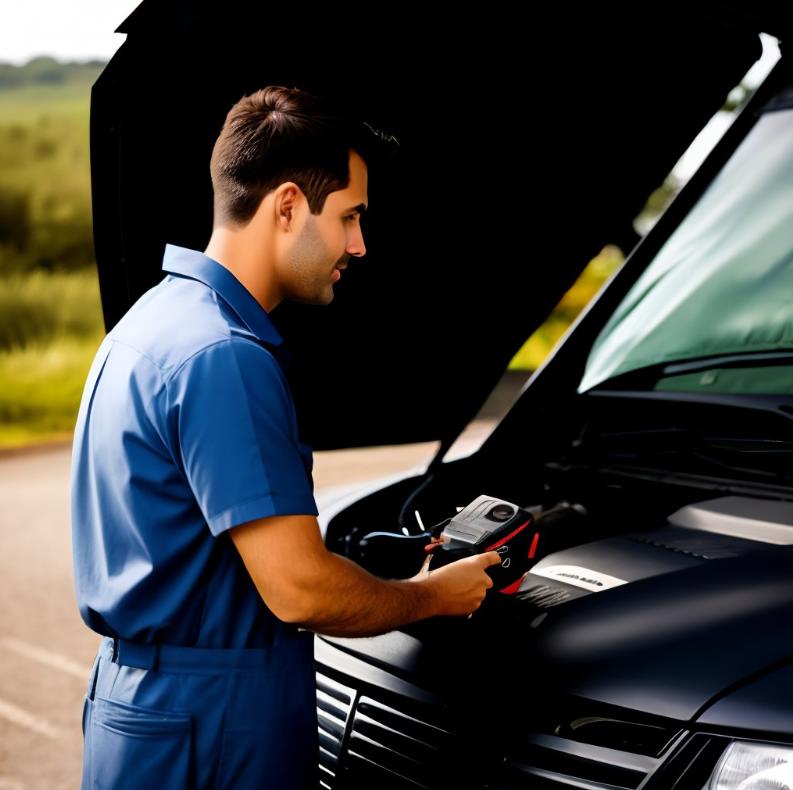
Can I Drive With a Bad Alternator?
You can drive a car with a bad alternator, but only for a short distance before the battery dies. Once the battery loses its charge, which usually takes 30 minutes to an hour, the car will stall without enough electrical power to run the engine.
The longer you drive, the more likely you’ll end up stranded when the car unexpectedly shuts off. That’s why it’s recommended to replace or repair a faulty alternator immediately rather than waiting and risking a breakdown.
How Long Does an Alternator Last?
On average, the typical lifespan of an alternator is 5-7 years or around 100,000 miles. However, extended periods of high heat, excessive electrical loads, corroded wiring, and cheap components can shorten the alternator’s working life. On the other hand, careful operation and maintenance can help maximize longevity.
Monitor your alternator around the 5-year or 100k mile marks for any signs of reduced performance. Be diligent about responding to warning signs like dim lights or battery drain. Catching problems early allows for less costly repairs and extends the life of your alternator.
Conclusion and Summary
The symptoms of a bad alternator include warning lights, dimming headlights, strange noises, stalling, and a car battery that keeps dying. Always test alternator output voltage and performance if you notice these issues. Catching a failing alternator early can help avoid a full breakdown.
Replace your alternator immediately if it can no longer maintain battery charge. Costs range from $200 to $400 depending on the car and parts. While a bad alternator can quickly drain a new battery, replacing one along with the alternator will allow the charging system to work properly again.
To recap, watch for these key signs of alternator failure:
- Battery continually dying
- Headlights or dashboard lights flickering
- High-pitched whining or screaming
- Burning smells from alternator
- Warning light illuminated on dash
- Car stalling out while driving
Testing voltage with a multimeter or having your local shop run diagnostics can confirm a bad alternator. Replace it promptly to get your vehicle charging properly and reliably again. Investing in a quality, reputable replacement alternator will help maximize its lifespan.





